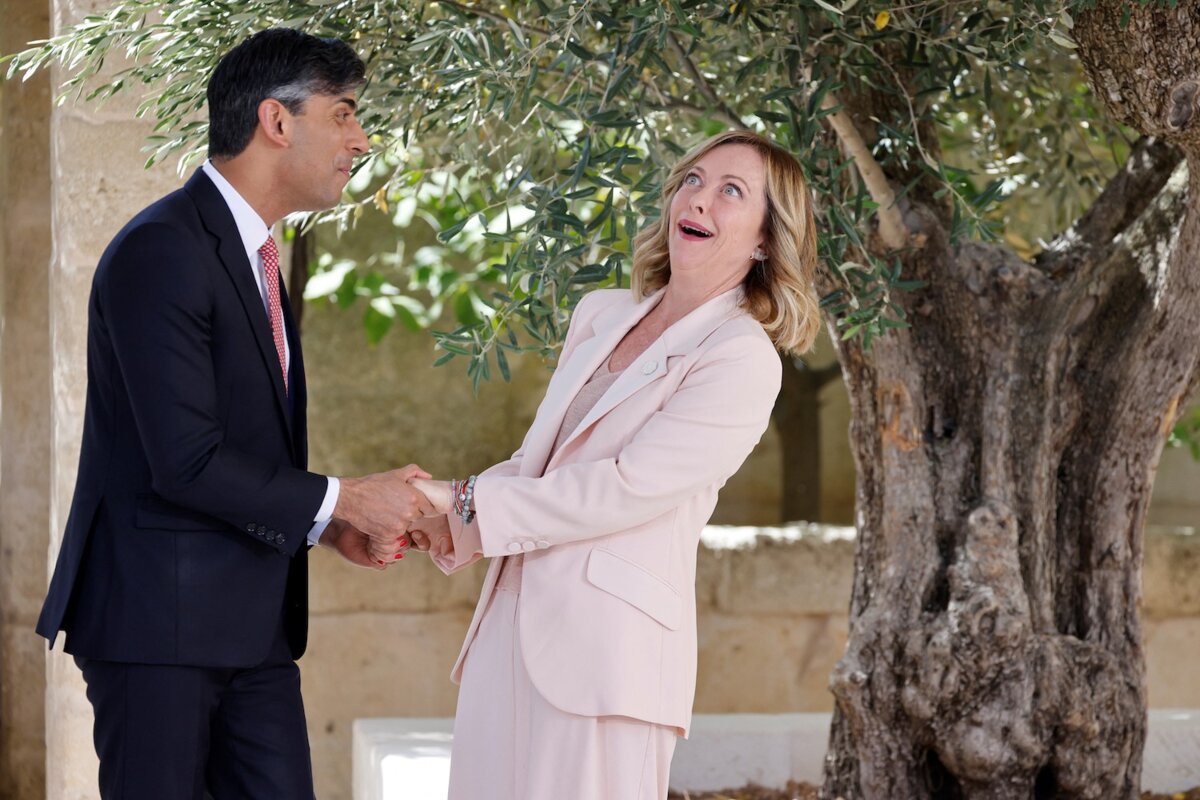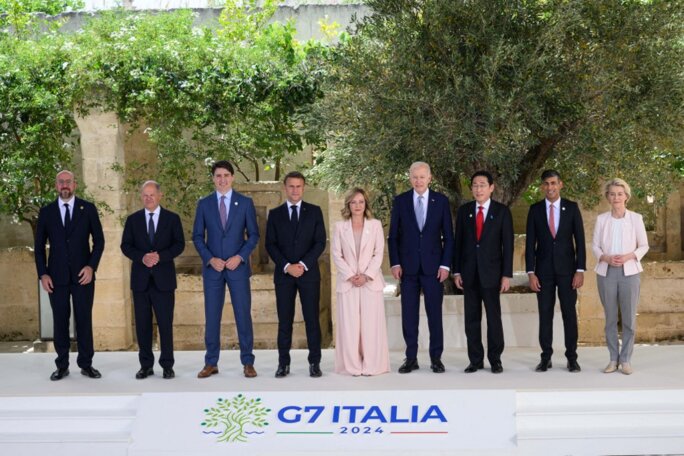Delving back into the archives can sometimes be a cruel exercise for political leaders. In 2017, after the election of Emmanuel Macron for his first five-year term in office, British weekly The Economist carried a photomontage on its cover in which the newly elected French president, under the headline “Europe’s saviour?”, was pictured walking across the sea, smiling, while close to him, sticking out of the water were a woman’s two feet in high heels. It was a representation of the triumph of the young former economy minister, and of the sinking, post-Brexit, of then British prime minister Theresa May.
Now, seven years later, following the debacle of his party in the European elections, and his subsequent decision to call snap national legislative elections, the man who was once seen by Europe’s liberals as providential now appears more like a gravedigger. For the “saviour” could prove to be responsible for handing power to the far-right in France, one of the principal power houses of the European Union and a permanent member of the United Nations Security Council.
On April 25th, the French president gave a speech at the Sorbonne university in Paris on the subject of the European Union (EU), when he warned: “We must be lucid about the fact that our Europe, today, is mortal. It can die, and that depends uniquely on our choices.” What was unknown at the time was that this prophet of misfortune, in the decision he took last Sunday to dissolve parliament and call snap elections, would make the choice of helping dig the grave of the EU.
By taking such a high-risk gamble, which some in Brussels have compared to that taken by former British prime minister David Cameron when he decided to hold the Brexit referendum, Macron has significantly weakened himself, just as a series of highly important international meetings are due. The first of these, a G7 summit, began on Thursday in Puglia, southern Italy.
Over three days, in the luxury resort of Borgo Egnazia, Italian Prime Minister Giorgia Meloni is hosting the six other members of this club of leaders of the principal Western nations – Canada, France, Germany, Italy, the UK and US, the president of the European Council, Charles Michel, the president of the European Commission, Ursula von der Leyen, and the prime minister of Japan.

Enlargement : Illustration 1

Following the G7 talks is an international summit for peace in Ukraine, to be held in Switzerland on June 15th and 16th, followed in turn by European Summit on June 27th and 28th, when the names of those who are chosen, pending approval by the European Parliament, to occupy the EU’s top jobs over the next five years will be announced. Finally, a NATO summit is to be held in Washington between July 9th and 11th, and which begins just two days after the second and final round of voting in France’s legislative elections.
Meloni in a 'position of force'
At the ongoing G7 summit, Meloni is “hosting all these leaders in a position of force”, commented political analyst Catherine Fieschi, a visiting fellow with the Robert Schuman Centre of the Florence-based European University Institute, noting Meloni’s victory in the European Parliament elections. “She has consolidated her power,” Fieschi told Mediapart. “Her campaign slogan for the Europeans [elections] was ‘Italy changes Europe’. It’s important to remember that because it gives an understanding of her perspective. After years of Europe dictating everything to Italy, it’s Italy which imposes itself on Europe.”
Furthermore, Meloni is in the position of acting as a mediator between the Right and far-right, capable of discussing with Ursula von der Leyen but also with Marine Le Pen and Viktor Orbán. For Catherine Fieschi, Meloni’s aim is “to change institutions from the inside, to create something more permeable to non-democracy and to conservative values.”
“Meloni is convinced that we have arrived at a moment of a shift in liberal democracies, as we have known them, and that it’s the moment to take hold of these institutions, in as much as she can, to position herself,” Fieschi added.
However, Meloni has not yet succeeded with her ambition of creating within the EU the union between the Right and far-right that she has succeeded in doing at home. "We have a clear objective, we want to do in Brussels what we did in Rome a year and a half ago,” she said at a campaign rally on June 1st, ahead of voting in the European Parliament elections. “To build a centre-right government in Europe and finally send the leftists, reds, greens and yellows, who have caused so much damage to our continent over the years, into opposition."
A 50-billion dollar loan for Ukraine
But that relative failure is nothing in comparison with the woes of the French and German leaders, Emmanuel Macron and Olaf Scholz, who were both severely weakened by the European election results. The other leaders among the G7 – which has acquired greater strength these past years due to the increasing weight of China, Russia and what some call ‘the Global South’ – are hardly better placed.
US President Joe Biden is preparing to face a new duel with his predecessor Donald Trump, whose eventual re-election in November cannot fail to cause a crisis in trans-Atlantic relations. British Prime Minister Rishi Sunak’s Conservative party, meanwhile, appears likely, according to opinion polls, to be buried by a landslide victory for the Labour party in snap elections called for July 4th. Canadian Prime Minister Justin Trudeau and his Japanese counterpart Fumio Kishida both now find themselves in testing political situations.

Enlargement : Illustration 2

All the while, there are major issues before them, including Ukraine, Gaza, relations with China, and migrations. On Ukraine, whose president Volodymyr Zelensky was present at the opening of the summit in Italy, the G7 have decided to give Kyiv a loan of 50 billion dollars, and plan to pay off interest on the loan by using the interest received from frozen Russian assets. Biden and Zelensky signed a ten-year bilateral security deal, which covers military, intelligence and training aid, while Sunak announced a new aid package for Kyiv worth 286 million euros.
In a riposte at China and Russia, and to counter accusations of double standards over Ukraine and Gaza, and also the negative label of “rich countries”, the G7 summit’s guests include the leaders of Algeria, Argentina, Brazil, Kenya, India, the United Arab Emirates and Tunisia.
In her opening speech at the summit on Thursday, Meloni declared: “Italy decided to host the leaders’ summit in Puglia, and this was by no means a random choice. We chose this location because Puglia is a region in the south of Italy, and the message we want to send out is that the G7 under the Italian presidency wants to strengthen its dialogue with nations in the Global South. We made this decision because Puglia has historically acted as a bridge between East and West. It is a land of dialogue in the centre of the Mediterranean, that ‘Middle Sea’ connecting the world’s two major maritime areas.”
Pope Francis was also invited to the event.
But because of the politically weakened positions of the G7 leaders, it was apparent that, apart from the initial announcements on Ukraine, no grand decisive moves were likely to emerge at the end of the summit. Interviewed by BBC News, Natalie Tocci, director of the Italian Institute for International Affairs, said that "if anything will come out of this summit, it's the fear of a catastrophe playing out before our eyes," in a reference to the possible election of Donald Trump in the US and the far-right in France.
In an interview with Mediapart, Agathe Demarais, a senior policy fellow for geo-economics at the think tank European Council on Foreign Relations, described the summit as “a particular situation, because any decision that might be taken at the G7 could be modified due to the electoral calendar, for potentially there would not be a parliamentary majority to approve it”.
While she says “the G7 is very important for trans-Atlantic relations”, she underlined that “we’re in a waiting situation, because if Trump is elected in November, all Biden’s promises will be undone”.
According to Spanish daily El País, it was before the summit began, that Meloni attempted to ensure the removal from the draft of the closing statement, to be issued on Friday evening, of a reference to the leaders’ “total commitment” in favour of women’s access to “safe and legal abortion and to post-abortion care”. Her attempt succeeded.
-------------------------
- The original French version of this report can be found here.
English version by Graham Tearse


